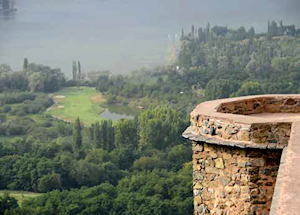
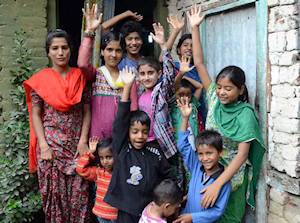
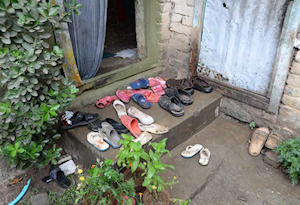
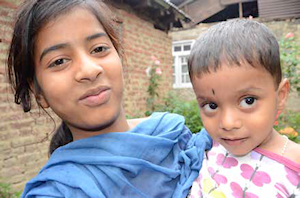
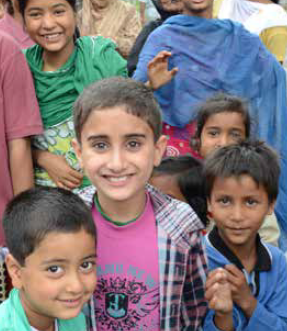
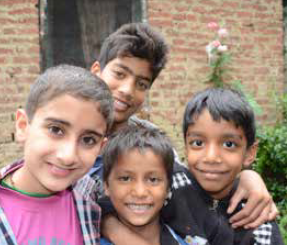
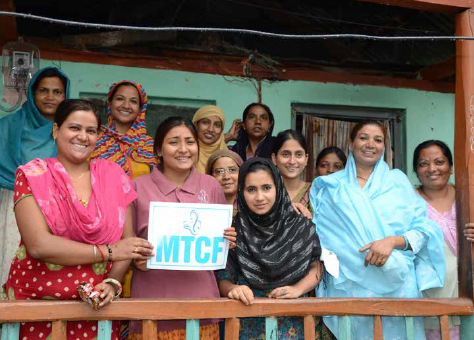
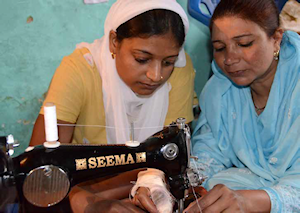
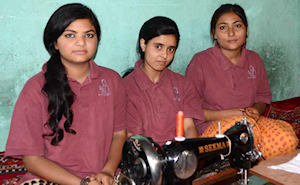
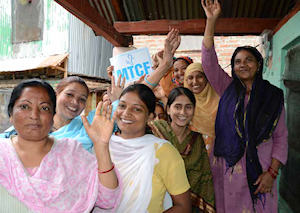
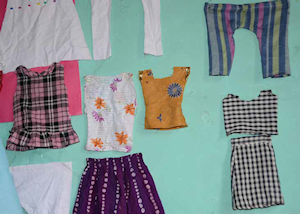
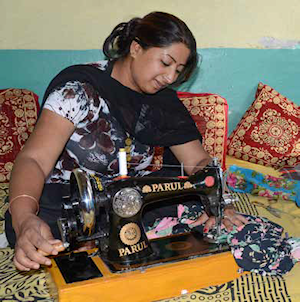
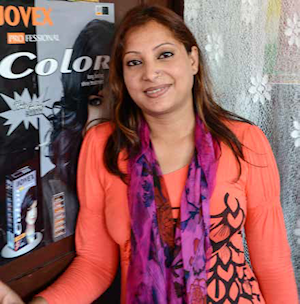
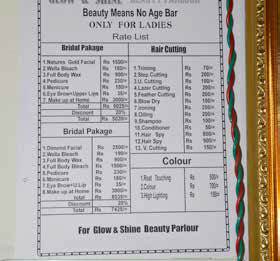
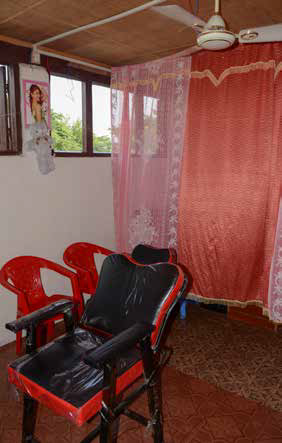
Creating Sustainable Futures in Kashmir
Mother Teresa Children's Foundation has responded to suffering families and children in Kashmir, India by providing emergency relief, educational opportunity, medical care and also through developing innovative programs to assist vulnerable families in creating sustainable futures.
Srinagar is the summer capital of the Indian state, Kashmir. Perched in northern India, it is famous for its raw beauty. It is surrounded by lakes and Mughal gardens with panoramic views and terraced lawns artfully created by emperors in ancient times.
The region is also notorious for its violent past and unclear future. Although formal conflict ceased in 2003, the dispute between India and bordering Pakistan over who should control Kashmir remains unresolved.
The streets of Srinagar are still very much in a militarized zone. Cars are stopped and searched at frequent checkpoints. Soldiers standing on every corner, machine guns slung over their backs, create a daily atmosphere of fear and oppression. For the people of Kashmir, it has been a slow recovery. They still suffer from cross-border terrorism as well as the economic and political upheaval that comes with living in an area mired in conflict.
According to Dr. Sajan George Kavinkalath, MTCF president, the suicide rate in Kashmir is escalating at an alarming rate. Frequent strikes, high unemployment, violent militants, police and security forces create constant tension and fear. People are becoming desperate to escape from the daily struggle. The uncertainty and constant disruption over the last two decades has decimated every aspect of life, from business to education.
"The situation here is hopeless for many people," said Dr. Kavinkalath. "Humanity survives on hope. When there is no hope, people give up and cannot sustain the will to survive."
Dr. Sajan George Kavinkalath sees a need to provide long-term solutions. "We can't change the uncertain political situation and social conditions, but we can provide vocational training and educate the children. They need to believe they have a pathway for a brighter future."
MTCF impacts lives of vulnerable children
In April 2012, MTCF began supporting struggling children in Kashmir in the village of Baramulla, located about sixty kilometers from the Pakistan border.
Many of the children had been thrown out of school. They were no longer able to attend because they could not pay the fees required or afford the purchase of textbooks, uniforms and simple things like pencils.
Through a several month process in early 2012, Dr. Kavinkalath made multiple trips into Kashmir and worked with liaisons on the ground to identify the most needy children in the village.
MTCF selected thirteen children ranging from age five to twenty. For about $120 USD per month, per child, MTCF is able to pay school fees, provide essential items like textbooks, supplies, uniforms, assist with hygiene items and also provide medical assistance.
Tanya, age 13, an orphan, is plagued with reoccurring nose bleeds. Several of the children are also having issues with their eyes, including Sonja, age 15. It may be trachoma, a bacterial eye infection common in slum areas where hygiene conditions are poor. Sumana, age 13, is losing chunks of hair.
Although the city is less than a two hour drive from the village where they live, the majority of the children indicate they have never seen the city or traveled very far outside of their village. MTCF will escort the children to Srinigar, where they will stay overnight and get medical attention.
"Being able to pay school fees and attend school and have some clothing has lifted some of the burden," said Shazia, sixteen years old. "I feel happy now… more content. We have a friend and advocate with Dr. Sajan," she said, referring to the MTCF president.
Vocational Training Provides Empowering Skills
MTCF has began transporting sewing machines into the village area of Baramulla and instituted a vocational program for women who are struggling to survive.
During the six month vocational training program, students gather in the village each day in shifts and spend two hours learning the art of tailoring and sewing. The group consists of sixteen women, who are all from impoverished families. They are single, married and widowed. Those who are married still suffer financial hardship because their husbands are uneducated. Men typically search for day jobs around the village, such as painting or construction labor, but jobs are few and far between. Money and food is sparse. Mother Teresa Children's Foundation is providing the sewing machines, fabric, supplies and training. Dr. Kavinkalath says he hopes to bring one thousand sewing machines into this distressed region in an attempt to provide poor women with skills that will enable them to earn money for their families.
Sema is married with one son."I hope to earn money for my family by being a tailor and making clothes that I can sell. We are eager to come. We are willing to work hard and learn. We are happy and thankful and want our children to have a good life and future."
Neena, 27, is the mother of three daughters. She also struggles because she is physically handicapped. Her husband works as a day laborer. She hopes to open a small store where she can sell the clothing she makes.
Hope through Skills
Rozy is thirty years old and the single parent of her six-year-old son, Samuel. Her husband fled the area shortly after Samuel's birth. She lives with her ailing parents, her handicapped brother, Michael, age 25 and her Sister, Ruby, age 27.
"I will never forget the suffering," said Ruby. "I remember when our family had no money and not even a drop of milk. We didn't even have one Rupee."
The Mother Teresa Children's Foundation first provided food and emergency relief for the family and then began a process of vocational training for the sisters, Rozy and Ruby.
MTCF purchased a sewing machine for Rozy, as well as the supplies and fabric needed to begin an apprenticeship program in sewing and tailoring. She engaged in about six months of training, including instruction from a professional tutor.
"Learning a skill is giving me the ability to help pay for the medical needs of my parents and brother. I can also make and mend clothes for my family and my son and pay the 800 rupees per month so my son can attend school," said Rozy.
Through MTCF, her sister, Ruby, has opened her own micro-business, a hair salon, located in the bustling city of Srinagar. After finishing her vocational training in beauty school, she first began working as an employee of a salon. Her clients generated 5,000 Rupees per day for the salon. However, Ruby's wages were a meager 2,000 Rupees per month, less than half of the money she generated in a single day.
Today, Ruby climbs 37 steps to the upper floor she rents in a building in the heart of the city. This is her salon. She cuts and colors hair, gives facials and proudly oversees the operations of her growing business.
"These are game changers. We are building lives through these vocational programs," said Dr. Kavinkalath. "We are extending a helping hand to people who are motivated and have a desire to work to improve their circumstances."
"I will never forget the bad times. But today, my family and I have new hope. I give thanks to God and also to the Mother Teresa Children's Foundation," said Ruby.